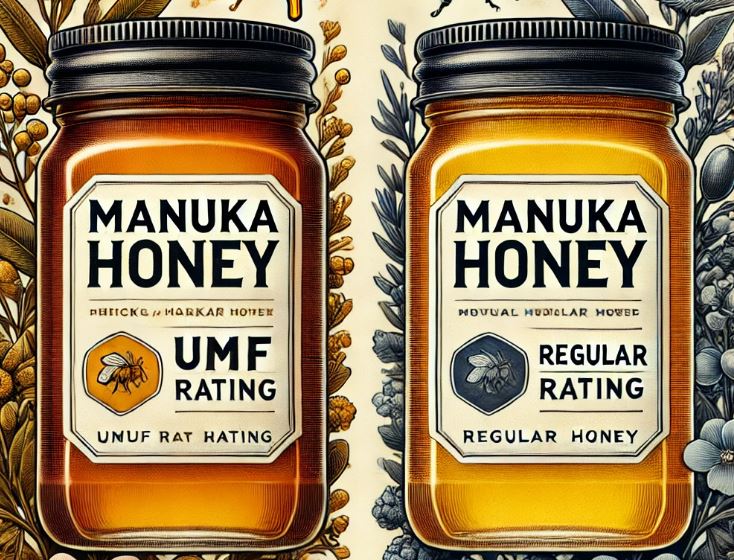What is the difference between Manuka and regular honey? When it comes to honey, not all varieties are created equal. Manuka honey, renowned for its unique health benefits, stands apart from regular honey in several significant ways. Understanding these differences can help you make informed choices for your health and culinary needs.
Key Takeaways
- Manuka Honey is derived from the nectar of the Manuka tree and contains unique compounds like methylglyoxal (MGO), which contribute to its potent antibacterial properties.
- Regular Honey is produced from the nectar of various flowers and generally offers antioxidant benefits, but lacks the specific bioactive components found in Manuka honey.
- Manuka Honey is more expensive due to its rarity and the labor-intensive process required for its production.
- Regular Honey is versatile in taste and texture, depending on the flowers from which it is derived.
Introduction
Manuka honey and regular honey are both popular sweeteners, but they differ significantly in their origins, composition, health benefits, and cost. This guide will delve into these differences to help you understand which honey might be best suited for your needs.
Origins: The Tale of Two Nectars
Manuka Honey
Manuka honey is produced by bees that pollinate the Manuka tree (Leptospermum scoparium), native to New Zealand and Australia. The Manuka tree flowers only bloom for a few weeks each year, making this honey relatively rare and highly sought after (Manuka Honey Organic) (Manukora).
Regular Honey
Regular honey is made from the nectar of various flowers, resulting in a wide range of flavors and colors. The composition of regular honey depends on the local flora and the bees’ foraging habits (Manukora).
Composition: What Makes Them Unique
Manuka Honey
Manuka honey contains unique bioactive compounds such as methylglyoxal (MGO), leptosperin, and potent fructo-oligosaccharides (prebiotics). These components contribute to its strong antibacterial, antiviral, and anti-inflammatory properties (Manuka Honey Organic) (Manukora).
Regular Honey
Regular honey primarily consists of sugars (fructose and glucose), water, vitamins, minerals, phenolic acids, and flavonoids. While it offers antioxidant benefits, it lacks the specific bioactive compounds found in Manuka honey (Manukora).
Health Benefits
Manuka Honey
- Antibacterial and Antimicrobial Activity: The high MGO content in Manuka honey gives it superior antibacterial properties, making it effective for wound healing and infection control (Bees & Trees Manuka Honey) (Verywell Fit).
- Digestive Health: Manuka honey’s prebiotics support a healthy gut microbiome, aiding digestion and reducing gastrointestinal issues (Manuka Honey Organic).
- Immune Support: Its unique compounds help strengthen the immune system, providing additional health benefits beyond those of regular honey (Manuka Honey Organic).
Regular Honey
- Antioxidant Properties: Regular honey contains antioxidants that help protect the body from oxidative stress and support overall health (Manukora).
- Cough Suppression: Both Manuka and regular honey can help suppress coughs, making them effective natural remedies for respiratory issues (Verywell Fit).
- Allergy Relief: Raw, local honey may help reduce seasonal allergy symptoms by exposing the body to small amounts of local pollen (Verywell Fit).
Taste and Texture
Manuka Honey
Manuka honey tends to be thicker, creamier, and has a distinctive earthy, slightly bitter flavor due to its unique compounds (Verywell Fit).
Regular Honey
The taste and texture of regular honey vary widely depending on the nectar source. It can range from light and floral to dark and robust (Manukora).
Recent Developments
- Medical Use: Manuka honey is increasingly used in medical settings for its wound-healing properties and effectiveness against antibiotic-resistant bacteria (Bees & Trees Manuka Honey).
- Research and Certifications: Ongoing research continues to explore the health benefits of Manuka honey, leading to more stringent certifications like UMF and MGO ratings to ensure authenticity and potency (Manuka Honey Organic) (Manukora).
Top Experts and Entities
- Bees & Trees: Provides detailed lab test reports on their Manuka honey batches, ensuring quality and authenticity (Bees & Trees Manuka Honey).
- Verywell Fit: Offers insights from healthcare professionals on the uses and benefits of Manuka honey (Verywell Fit).
Conclusion – What is the Difference Between Manuka and Regular Honey?
Manuka honey and regular honey each offer unique benefits, with Manuka honey standing out for its potent antibacterial properties and unique bioactive compounds. Whether you choose Manuka honey for its health benefits or regular honey for its versatility and flavor, understanding these differences can help you make the best choice for your needs.
Internal Links
- What is the Difference Between Club Soda and Sparkling Water?
- What is the Difference Between Brown and White Eggs?
- What is the Difference Between Latte and Cappuccino?
- What is the Difference Between Gelato and Ice Cream?
- What is the Difference Between a Stromboli and a Calzone?
Author
This article was written by HowDiff, experts in writing comparison articles across a variety of topics.
